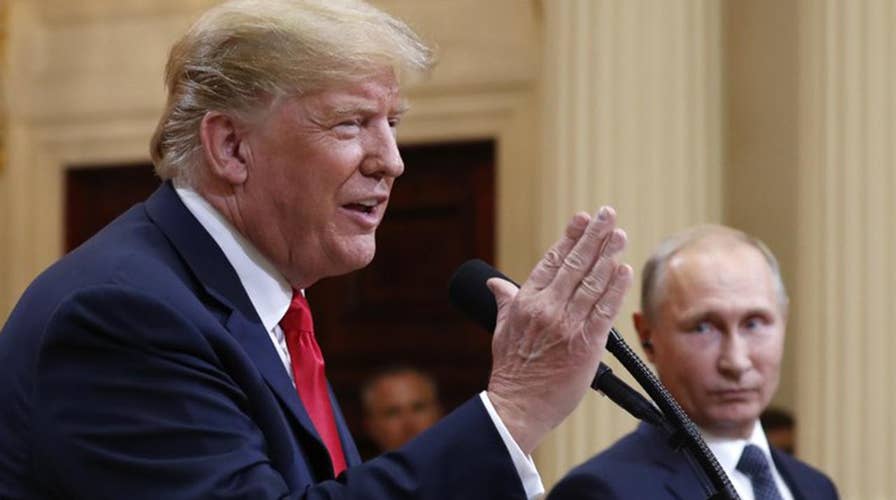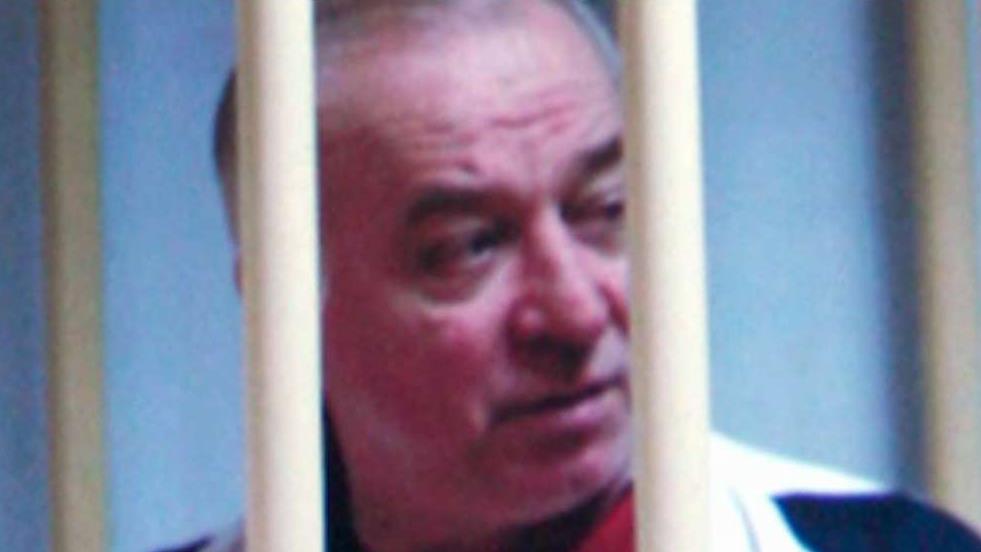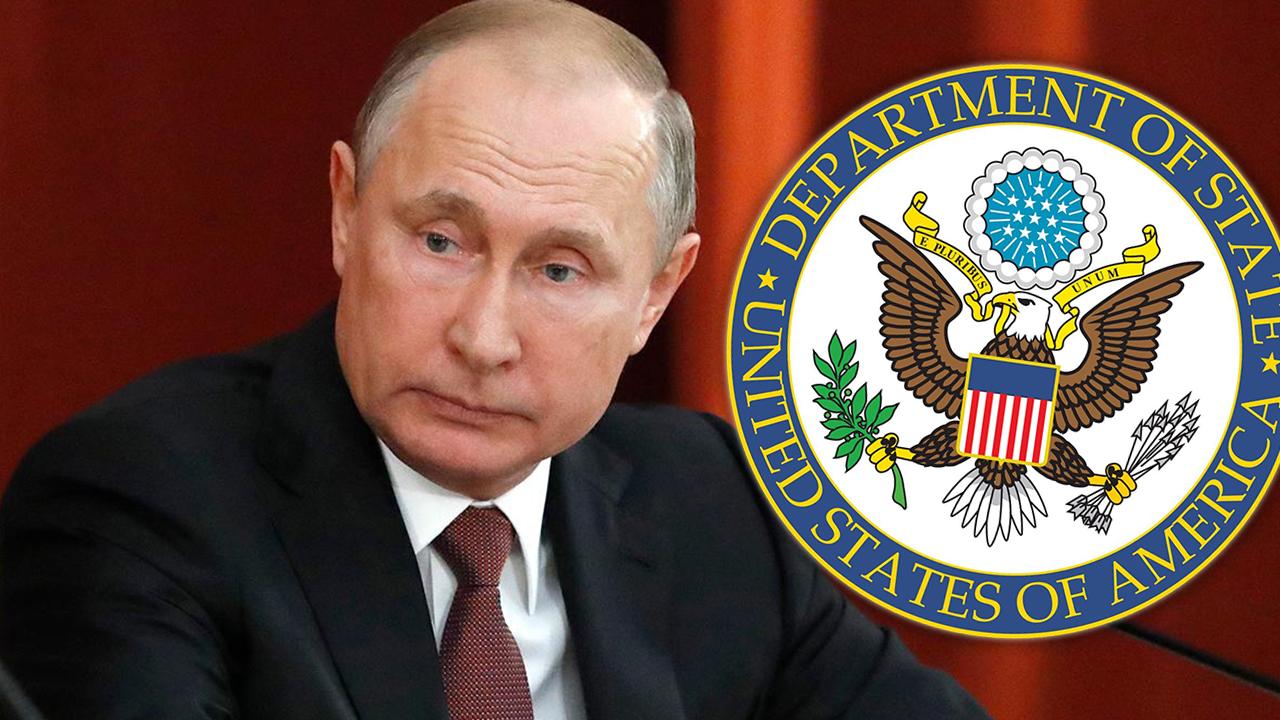Trump to hit Russia with new sanctions over chemical attack
State Department says it will impose new sanctions on Russia for using a nerve agent to poison a former spy and his daughter in Britain.
President Trump has taken strong action that proves the absurdity of charges by his critics that he is too close to Russia and its leader, President Vladimir Putin. The Trump administration announced Wednesday that the U.S. will impose tough new trade sanctions on Russia in response to the poisoning and attempted murder of a former Russian spy and his daughter in Britain.
The new sanctions, which will take effect on about Aug. 22, will deny export licenses to American companies that want to sell technology and other items with national security implications to companies funded or owned by the Russia government. A State Department official told reporters the sanctions could affect 70 percent of the Russian economy and 40 percent of its workforce.
Some technology exports are expected to get exemptions from the sanctions. These include parts for civilian planes to ensure they fly safely and parts for the International Space Station.
If you think the new sanctions are a token effort for public relations purposes you’re wrong.
The Associated Press reported Thursday: “In the morning, the Russian ruble sank to the lowest levels since April on the news of the new sanctions before recovering slightly later in the day. The shares of Russian state-controlled banks, the national carrier Aeroflot and other companies also tanked.”
A senior White House official told me the new sanctions prove the Trump administration isn’t afraid to confront Russia when needed. He said: “For anyone who thinks this administration is weak on Russia I say do this: look at what we have done, look at our actions, not what comes out of the left’s mouth. What do we need to do?” to satisfy critics. “This administration is truly using the Reagan playbook when it comes to checking Moscow. It just feels like no one is seeing what we are doing.”
The new U.S. sanctions are a response to a determination by the State Department that Russia used the nerve agent Novichok to poison former Russian spy Sergei Skripal and his daughter Yulia in England. They both recovered from the murder attempt.
In imposing the sanctions under a 1991 law that requires action against countries responsible for a chemical or biological weapons attack, President Trump showed he will not give Putin a free pass for his intolerable actions.
By the poisoning of the Skripals – which Russia denies – Putin has shown once again that he is running a rogue regime. He loves invading other nations, annexing territories that don’t belong to Russia, shooting down civilian airliners and arming America’s enemies.
It seems as if Moscow doesn’t give a damn what anyone else thinks about its actions on the world stage, including savagely trying to kill dissidents on British soil in the most terrible ways imaginable.
While the world was hopeful in the early 1990s that Russia could join the West – maybe even NATO someday – those days are long gone. Moscow, and especially the thugs who occupy the Kremlin, see challenges everywhere to their reign of terror. And they will try to kill anyone or crush anything in their way.
The good news is we know how to do deal with leaders of a rogue Russia: don’t give an inch of ground and contain their worst impulses until they feel enough pain to back off. It worked for President Reagan, and it will work for President Trump.
And, at its core, that is what the President Trump and his administration are doing – but they feel, with some justification, that no one is listening.
The new sanctions should be seen as part of a much larger policy shift to make sure Russia truly understands that anytime it wants to lash out at the West, NATO allies or any U.S. partner there will be a hefty price to be paid.
In fact, you know what this policy is if you have studied just the smallest shred of history – it was known as containment when applied to the Soviet Union during the Cold War years. Now, thanks to President Trump, it is coming to Vladimir Putin’s doorstep.
The examples are there, if people would just open their eyes, to strong actions the Trump administration has taken.
First, President Trump and his team cleaned up the mess of a policy the Obama administration left behind when it comes to Ukraine. The small nation – once part of the Soviet Union – was hopelessly outmanned and outgunned by invading Russian forces and their separatist allies. President Obama hesitated, vacillated, equivocated and pondered with deep thoughts – but failed to take effective action.
The Trump administration is now rightly arming Ukraine – something that should have happened years ago. While President Obama might have given more eloquent speeches, President Trump knows how to respond with the eloquence of action.
And if Russia pushes even further don’t be shocked if President Trump pushes for Ukraine to join NATO – one of Moscow’s worst nightmares.
Next, while President Trump’s critics might attack him for lashing out at the woeful underspending record by NATO nations on their own defense, the alliance is slowly increasing its overall capabilities and budgets – thanks to his demand that NATO member nations spend more on protecting themselves from Russia.
If there is a day when NATO nations must stare down the Russian bear in the Baltics, in the Black Sea or elsewhere they will have the tools to deter and defeat any aggression Moscow wants to throw their way – all because President Trump told them to stop freeloading off Uncle Sam.
And President Trump has shown he won’t allow Russian-backed allies to get away with committing mass murder. When Syrian dictator Bashar Assad used chemical weapons on his own people, President Trump did not walk away – he kept his word and bombed Syria to make sure Assad paid a price for his actions, and to warn Assad not to use chemical weapons again. Russia threatened to retaliate if we attacked its ally, but the Russians backed down when faced with a strong American president who keeps his word.
But to be fair, it’s true that Team Trump’s Russia policy sometimes sends members of the Washington foreign policy establishment into fits of rage – and sometimes I can see their point. President Trump – rightly or wrongly – loves to butter up his opponents, sweet talk them, even sometimes praise them.
But isn’t it clear what the strategy is by now? Why do critics see President Trump’s strategic kindness as weakness? Trump is all business in his approach, and he smartly realizes you get nowhere by insulting the person you want to make agreements with and draw concessions from.
The foreign policy establishment needs to understand that the president can smile at our opponents while also working to undermine them and pursue our national interests.
Let’s not mistake flattery for weakness. The art of smart foreign policy is realizing you have to work with dictators and despots you don’t like. President Trump might not have a Ph.D. in political science from Harvard, but he knows he needs to work with people no one in their right mind likes or respects.
Going forward, Russia should know that the Trump administration is quite willing and able to ramp up the pressure and respond to whatever Putin throws our way. Russia already lost the Cold War. If Putin wants to start a Cold War 2.0, he should realize it will not end well for him or his country.











































